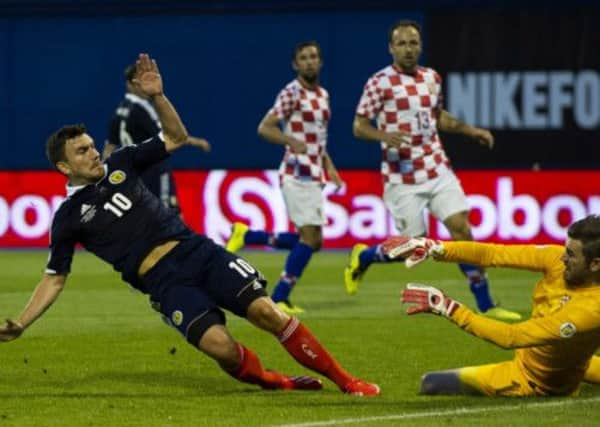Makeshift Scots defy odds for famous Croatia win


Yet this most pragmatic of individuals saw one of his own theories utterly confounded last night in Zagreb, delightfully so from his perspective as he savoured a remarkable victory.
On the day he named his squad for this match, Strachan had lamented the lack of players with significant experience of top level European club football currently available to him. It was as if he was laying out the reasons, if not excuses, for what most observers anticipated would be a heavy defeat for Scotland against a Croatian team ranked fourth best on the planet. His concern over the lack of exposure to elite football of his players seemed completely justified and certainly starkly illustrated when the teams were announced at the Maksimir Stadium.
Advertisement
Hide AdAdvertisement
Hide AdOnly four of the Scotland starting line-up have performed in the Champions League – the former Rangers trio of Allan McGregor, Alan Hutton and Steven Whittaker along with ex-Celtic man Shaun Maloney. None of them played in Europe for their current clubs in the season just ended. Of the other seven players in the side named by Strachan, only two have tasted European club football. Skipper James Morrison has not done so for seven years, however, since helping Middlesbrough reach the Uefa Cup final while Aston Villa’s Barry Bannan’s continental experience amounts to just three appearances in the Europa League.
Contrast that with a Croatia side laden with Champions League level players, from captain Darijo Srna of Ukrainian giants Shakhtar Donetsk at the back to recent Wembley winner of Europe’s elite tournament, Mario Mandzukic of Bayern Munich in attack.
It is certainly a painful indication of the falling standards of players Scotland can choose from, even allowing for the absence of experienced men such as Manchester United’s Darren Fletcher and Celtic’s Scott Brown.
But this was to be an evening when football’s unending capacity for unpredictability favoured what was very much a makeshift Scottish line-up. Yes, Croatia underperformed woefully. If the Fifa rankings were compiled on aesthetic merit rather than results, they would be drummed out of the top 100 on the basis of their feeble display last night.
That should not diminish the credit due to Strachan and his players, however. Intelligently organised and ferociously committed, Scotland gave their manager and the Tartan Army real encouragement that better times could lie ahead. What a pity a performance like this has come too late to make a difference in a World Cup campaign in which, less we forget, Scotland were the first European nation formally eliminated.
For Strachan, of course, the focus is firmly on putting a system in place which gives his squad the best possible chance of success in the 2016 European Championship qualifiers. With those finals in France extended to 24 countries, it should provide Scotland with their best opportunity yet to end the long exile from the business end of major tournaments. Yet even with the top two nations from each of the nine groups qualifying automatically, with a third-place finish guaranteeing a play-off slot, recent form has suggested it will still be a tall order for the Scots.
But last night’s victory, which ensures Scotland will avoid dropping into the fifth pot of seeds for the Euro 2016 draw next year, provides welcome reassurance that they should have the capacity to compete credibly for a return to French soil 18 years after their World Cup finals appearance there which preceded the long, painful exile.
One of Strachan’s biggest problems is finding a central defensive partnership he can rely on. The dearth of quality in that area has been an increasing cause of concern for Scotland managers in recent years. For a man who spent much of his career with the comfort of having Willie Miller and Alex McLeish behind him, it must be acutely alarming for Strachan.
Advertisement
Hide AdAdvertisement
Hide AdIn his first match in charge against Estonia in February, he went with Andy Webster and Christophe Berra. In the March Group A double-header defeats to Wales and Serbia, the pairing of Gary Caldwell and Grant Hanley failed to impress. Last night, while there were a couple of jittery moments in the early stages and one especially reckless passback from Hanley which went unpunished, the new duo of the young Blackburn man and unheralded Norwich City captain Russell Martin delivered a highly encouraging collective contribution.
Martin was particularly impressive, backing up his club-mate Snodgrass’ pre-match assertion that Scotland have not seen the best of him yet and that the 27-year-old is capable of nailing down a regular berth in Strachan’s back four. On this evidence, it shouldn’t be too long before Martin loses his anonymity with the taxi drivers at Glasgow Airport when he reports for international duty.
Other eye-catching performers for Scotland were right-back Hutton, back to the kind of form which once made him an £8 million player, and Wigan midfielder James McArthur whose industriousness bordered on the manic. There were flashes of genuine class from his club-mate Maloney, whose darting run forced the break of the ball in the area which allowed Robert Snodgrass to plunder the only goal in the 26th minute. The Norwich midfielder is another who has firmly staked his claim to be a mainstay of Strachan’s plans in the next campaign.
Gaining continuity of selection will inevitably be an issue for Strachan. Just four matches into his tenure, he has already used 28 players. Just two of those – Hutton and Maloney – have started all four games. Like any Scotland boss, he will be at the mercy of call-offs. But last night has shown him that regardless of the stature of those players at his disposal from match to match, notionally superior opposition can be combated to good effect.